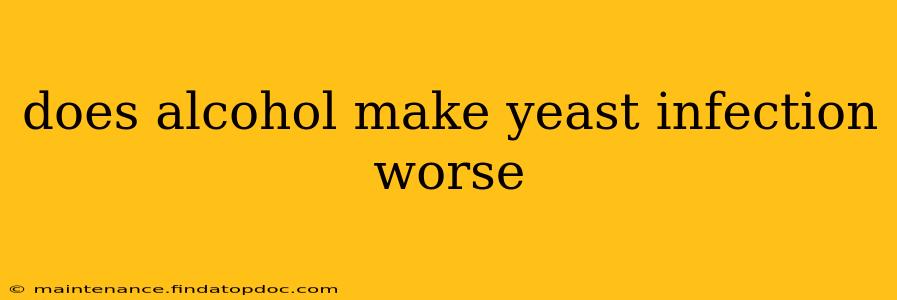Yeast infections, medically known as candidiasis, are common fungal infections caused by an overgrowth of Candida albicans, a fungus naturally present in the body. While many factors contribute to yeast infections, a frequently asked question is whether alcohol consumption exacerbates the condition. The short answer is: yes, alcohol can worsen yeast infections, though the exact mechanism and severity vary depending on several factors.
How Does Alcohol Affect Yeast Infections?
Alcohol's impact on yeast infections isn't directly causal, but rather, it contributes to an environment where Candida thrives. Here's how:
-
Immune System Suppression: Alcohol consumption, especially excessive drinking, weakens the immune system. A weakened immune system struggles to fight off infections, including yeast infections, allowing Candida to proliferate more easily.
-
Gut Microbiome Disruption: Alcohol disrupts the delicate balance of the gut microbiome, the community of microorganisms residing in the intestines. This disruption can lead to an overgrowth of Candida in the gut, which can then spread to other areas of the body.
-
Blood Sugar Imbalance: Alcohol can affect blood sugar levels, leading to spikes and crashes. High blood sugar provides Candida with a readily available food source, promoting its growth and potentially worsening an existing yeast infection.
-
Dehydration: Alcohol is a diuretic, meaning it increases urine production and can lead to dehydration. Dehydration can further weaken the immune system, making the body more susceptible to infections like yeast infections.
-
Medication Interactions: Certain medications used to treat yeast infections can interact negatively with alcohol, potentially reducing their effectiveness or causing adverse side effects. Always consult your doctor or pharmacist about potential interactions before consuming alcohol while on medication.
What are the symptoms of a yeast infection?
Recognizing the symptoms is crucial for prompt treatment. Common symptoms include:
-
Vaginal Yeast Infection: Itching, burning, redness, swelling of the vulva and vagina, thick white discharge, pain during intercourse.
-
Oral Thrush: White patches on the tongue, inner cheeks, gums, or tonsils, difficulty swallowing, soreness.
-
Other Yeast Infections: These can manifest as skin rashes, nail infections, or even more serious systemic infections in immunocompromised individuals.
Can alcohol cause a yeast infection?
While alcohol doesn't directly cause a yeast infection, it can be a contributing factor to its development or worsening, especially in individuals already predisposed to the condition. It's not the sole cause but can act as a trigger or exacerbating factor.
Should I avoid alcohol completely if I have a yeast infection?
While complete abstinence might not be necessary for everyone, it's advisable to significantly limit or avoid alcohol consumption, especially during a yeast infection. Moderation is key, and the best course of action is to consult a healthcare professional for personalized advice.
What if I already have a yeast infection and I've been drinking alcohol?
If you have a yeast infection and have been consuming alcohol, it's essential to consult a doctor or other qualified healthcare professional. They can assess your situation, prescribe appropriate treatment, and provide guidance on managing your condition. Remember, self-treating can sometimes worsen the infection.
How can I prevent yeast infections?
Preventing yeast infections involves several strategies:
- Maintain a healthy immune system: Eat a balanced diet, get enough sleep, and manage stress levels.
- Practice good hygiene: Keep the genital area clean and dry.
- Wear breathable clothing: Avoid tight-fitting clothes, especially underwear.
- Limit sugar intake: High sugar levels can fuel Candida growth.
- Manage blood sugar levels: This is particularly important for individuals with diabetes.
By understanding the interplay between alcohol consumption and yeast infections, you can take proactive steps to manage your risk and maintain your health. Remember that this information is for educational purposes and does not constitute medical advice. Always consult a healthcare professional for diagnosis and treatment of any medical condition.
